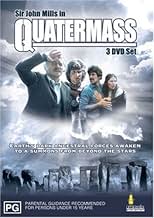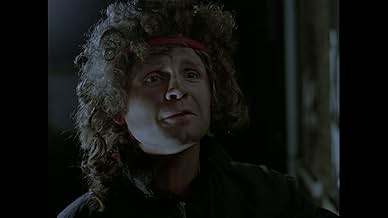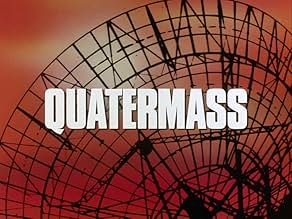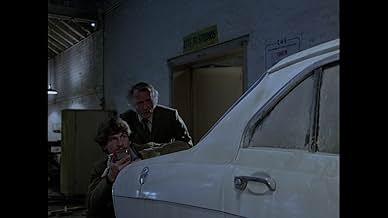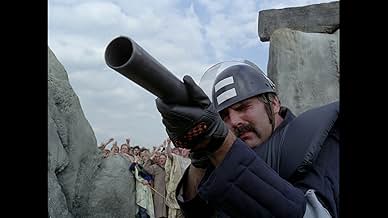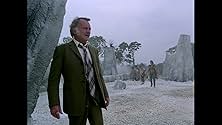VALUTAZIONE IMDb
6,9/10
925
LA TUA VALUTAZIONE
Aggiungi una trama nella tua linguaIn the distant future, a now-elderly Bernard Quatermass investigates the disappearance of his granddaughter and a mysterious cult.In the distant future, a now-elderly Bernard Quatermass investigates the disappearance of his granddaughter and a mysterious cult.In the distant future, a now-elderly Bernard Quatermass investigates the disappearance of his granddaughter and a mysterious cult.
Sfoglia gli episodi
Recensioni in evidenza
It is the near future. Britain struggles with the collapse of civilisation and violent bands of urban guerrillas rule. Also Earth is being harvested. Ancient sites of gathering all over the globe turn out to be the focal points of a blinding and powerful ray from outer space that leaves a pile of ash where thousands once stood. Various elements of Homo sapiens are essential to an anonymous alien race, and once again the time is, or rather we are, literally, ripe. It falls on the now retired Professor Bernard Quatermass, veteran of weird goings on long before Fox Mulder, to basically save the planet. Again.
The idea of a fourth Quatermass serial was kicked around the BBC for three years before being finally commissioned in 1971, and then later dropped by them as being too expensive. The production was picked up by Euston Films, Thames Television's TV film-making subsidiary (their most famous production at the time being the uncompromising and controversial police drama 'The Sweeney'). Euston increased the budget to £300,000 per episode with the criterion that the final product be produced in two versions: four fifty-minute episodes plus a single, shortened version for theatrical release and overseas markets in order to recoup some of their production costs. This created a writing dilemma for original creator and writer Nigel Kneale who now had to come up with two scripts for the same story. He neither wanted the theatrical release to be an edited version of the series, nor the series to be a padded out version of the film. Both had to work in their own right, and, thanks to Kneale's skill (he was an experienced screenwriter and at one time 'script doctor' for the BBC), they do. Unfortunately with the story having been written in 1972 and reflecting the political and economic concerns of that time, by the time it reached the screens in 1979, with it's new-age hippy type characters, it was already out of date (though it is still superior to the recent and dreadful '28 Days Later').
Euston also wanted a big name to play the lead, hence Sir John Mills, who is badly miscast and clearly looks as uneasy as he reportedly was with the role. Gone is the bombastic, resourceful yet flawed character played in the '50s BBC serials by Reginald Tate and brilliantly by Andre Morell, and later more famously by Andrew Keir in Hammer's 1967 'Quatermass and the Pit' (American actor Brian Donlevy had played the role in the first two Hammer Films but Kneale so hated him in the role he withheld permission to make a third Quatermass film for ten years). Here Mills plays him as a semi-senile, despairing, doddering tired old man. He is as much Quatermass as Peter Cushing was Dr. Who, but he fulfilled the need of the 'big name' at the time, being not only an already established British film dignitary and household name, but also then still familiar to TV audiences as having recently appeared in the popular 'Zoo Gang'. But it is hard to believe this is meant to be the same Quatermass we have seen in previous incarnations.
The plusses though are in the production values. At that time most British TV drama series tended to be controlled environment, studio bound affairs with the odd bit of grainy location footage (a la 'Dr. Who', 'Doomwatch' etc.) but 'Quatermass' was, strikingly for the time, shot entirely on location on 35mm Panavision, with great expense being laid out particularly on Joe Kapp's radar facility and home. It was also intended that Stonehenge would be one of the main locations. Permission to use it was however withdrawn by the British Tourist Board because it had become very popular with tourists and they didn't want anyone, or anything, even by inference (in the script several thousand people get fried simply by gathering there, so I suppose not a good selling point from their point of view), jeopardising their little earner.
Sci-Fi/Fantasy film and TV buffs will enjoy early appearances by Simon MacCorkindale, later of the short lived series 'Manimal'; Brian Croucher (the second 'Travis' in 'Blake's 7'); Declan Mullholland (the original, later CGI'd out, actor who played 'Jabba the Hutt' in 'Star Wars') as a TV Studio guard; David Yip, who would be Indie's ill-fated accomplice in the 'Club Obi-Wan' in the opening sequence of 'Indiana Jones and the Temple of Doom'; and, talking of Indie, a major role played by Margaret Tyzack, who would later become the young Indie's long-suffering Oxford tutor in 'The Young Indiana Jones Chronicles'. Also featured in an early role is Brenda Fricker, later to win an Oscar for Best Supporting Actress in 'My Left Foot'. Executive Producer Verity Lambert was already well known to fans of this genre for her involvement with 'Dr. Who' and 'The Avengers'.
If you are a Quatermass fan, a fan of British Sci-Fi, or even a budding screenwriter wanting to pick up a few tips, then this is an essential addition to your library. The set is nicely presented and is released to coincide with the 50th anniversary of the first broadcast of 'The Quatermass Experiment' in 1953. The package folds out to an 18" picture of (ironically) Stonehenge. The two discs containing the four episodes, simply called 'Quatermass', feature extensive production notes, animated menus, the opening and closing titles for each episode with each episode having a spectacular cliffhanger ending, making you eager to watch the next, and the hours pass swiftly. The third disc contains the theatrical version, retitled 'The Quatermass Conclusion', and a previously unseen Sci-Fi Channel interview with Nigel Kneale. Also enclosed is a booklet on the Quatermass history.
Overall it is an engrossing watch, but as Nigel Kneale himself says: "It was a product of its time."
The idea of a fourth Quatermass serial was kicked around the BBC for three years before being finally commissioned in 1971, and then later dropped by them as being too expensive. The production was picked up by Euston Films, Thames Television's TV film-making subsidiary (their most famous production at the time being the uncompromising and controversial police drama 'The Sweeney'). Euston increased the budget to £300,000 per episode with the criterion that the final product be produced in two versions: four fifty-minute episodes plus a single, shortened version for theatrical release and overseas markets in order to recoup some of their production costs. This created a writing dilemma for original creator and writer Nigel Kneale who now had to come up with two scripts for the same story. He neither wanted the theatrical release to be an edited version of the series, nor the series to be a padded out version of the film. Both had to work in their own right, and, thanks to Kneale's skill (he was an experienced screenwriter and at one time 'script doctor' for the BBC), they do. Unfortunately with the story having been written in 1972 and reflecting the political and economic concerns of that time, by the time it reached the screens in 1979, with it's new-age hippy type characters, it was already out of date (though it is still superior to the recent and dreadful '28 Days Later').
Euston also wanted a big name to play the lead, hence Sir John Mills, who is badly miscast and clearly looks as uneasy as he reportedly was with the role. Gone is the bombastic, resourceful yet flawed character played in the '50s BBC serials by Reginald Tate and brilliantly by Andre Morell, and later more famously by Andrew Keir in Hammer's 1967 'Quatermass and the Pit' (American actor Brian Donlevy had played the role in the first two Hammer Films but Kneale so hated him in the role he withheld permission to make a third Quatermass film for ten years). Here Mills plays him as a semi-senile, despairing, doddering tired old man. He is as much Quatermass as Peter Cushing was Dr. Who, but he fulfilled the need of the 'big name' at the time, being not only an already established British film dignitary and household name, but also then still familiar to TV audiences as having recently appeared in the popular 'Zoo Gang'. But it is hard to believe this is meant to be the same Quatermass we have seen in previous incarnations.
The plusses though are in the production values. At that time most British TV drama series tended to be controlled environment, studio bound affairs with the odd bit of grainy location footage (a la 'Dr. Who', 'Doomwatch' etc.) but 'Quatermass' was, strikingly for the time, shot entirely on location on 35mm Panavision, with great expense being laid out particularly on Joe Kapp's radar facility and home. It was also intended that Stonehenge would be one of the main locations. Permission to use it was however withdrawn by the British Tourist Board because it had become very popular with tourists and they didn't want anyone, or anything, even by inference (in the script several thousand people get fried simply by gathering there, so I suppose not a good selling point from their point of view), jeopardising their little earner.
Sci-Fi/Fantasy film and TV buffs will enjoy early appearances by Simon MacCorkindale, later of the short lived series 'Manimal'; Brian Croucher (the second 'Travis' in 'Blake's 7'); Declan Mullholland (the original, later CGI'd out, actor who played 'Jabba the Hutt' in 'Star Wars') as a TV Studio guard; David Yip, who would be Indie's ill-fated accomplice in the 'Club Obi-Wan' in the opening sequence of 'Indiana Jones and the Temple of Doom'; and, talking of Indie, a major role played by Margaret Tyzack, who would later become the young Indie's long-suffering Oxford tutor in 'The Young Indiana Jones Chronicles'. Also featured in an early role is Brenda Fricker, later to win an Oscar for Best Supporting Actress in 'My Left Foot'. Executive Producer Verity Lambert was already well known to fans of this genre for her involvement with 'Dr. Who' and 'The Avengers'.
If you are a Quatermass fan, a fan of British Sci-Fi, or even a budding screenwriter wanting to pick up a few tips, then this is an essential addition to your library. The set is nicely presented and is released to coincide with the 50th anniversary of the first broadcast of 'The Quatermass Experiment' in 1953. The package folds out to an 18" picture of (ironically) Stonehenge. The two discs containing the four episodes, simply called 'Quatermass', feature extensive production notes, animated menus, the opening and closing titles for each episode with each episode having a spectacular cliffhanger ending, making you eager to watch the next, and the hours pass swiftly. The third disc contains the theatrical version, retitled 'The Quatermass Conclusion', and a previously unseen Sci-Fi Channel interview with Nigel Kneale. Also enclosed is a booklet on the Quatermass history.
Overall it is an engrossing watch, but as Nigel Kneale himself says: "It was a product of its time."
Nigel Kneale wrote a story here equally as inventive and thought provoking as QUATERMASS AND THE PIT. Perhaps more cerebral and decidedly less horrific, but no less disturbing in its connotations. The concept of an alien technology "harvesting" the world's youth for its own physiological needs is both original and brilliant in its execution. Like its forerunners, originally shown as a mini-series, this being an arguably effective re-edit!
Where the film cannot hold-up to its predecessors unfortunately, is that it was done "on the cheap" and much as I personally respect and admire Sir John Mills' wonderful career (its unassailable highlights being the village idiot in RYANS DAUGHTER and Captain Anson in ICE COLD IN ALEX) for me, he doesn't have the physical presence for the role of Professor Quatermass! Simon MacCorkindale additionally, is a bit on the wussy side for my money. But hey, let's move on to the positives!
The setting of England, moving into a near post-apocalyptic state with anarchy ruling, the Police in the hands of Private ownership is pretty cool for 1978 - we're getting there nicely! Mills portrays the old disillusioned and resigned-to-it-all Quatermass so well. Retired now, all he wants in life is to find his missing grand-daughter. When the first terrifying beam from space sucks up its first victims and destroys a joint Anglo-Russian Space project, he is summoned to assist the Ministry.
Kneale has his knee on the viewer's neck at times as the beam returns for more of the world's youth. Although the budget ran obviously to limited fx, the attack on Wembley Stadium leaves any aware and thinking person with real spinal tap! Again, Kneale resorts to an association with lore and magic and the images of the hippie-esque multitudes as they converge on Stonehenge singing "Huffity Puffity Ringstone Round" are as chilling as any scenes I have ever seen. Kneale reaches right out of the screen here and puts one in an arm-lock. You ain't going nowhere, but WITH them to Ringstone Round!
Quatermass' ultimate understanding of the code and what it all means is literate stuff, his plan to rebuff the alien threat sheer genius. Without giving anything away, the final scene with his granddaughter ranks as one of the most moving and shatteringly emotional scenes in film history. If you can't SEE that, what a shame!
Where the film cannot hold-up to its predecessors unfortunately, is that it was done "on the cheap" and much as I personally respect and admire Sir John Mills' wonderful career (its unassailable highlights being the village idiot in RYANS DAUGHTER and Captain Anson in ICE COLD IN ALEX) for me, he doesn't have the physical presence for the role of Professor Quatermass! Simon MacCorkindale additionally, is a bit on the wussy side for my money. But hey, let's move on to the positives!
The setting of England, moving into a near post-apocalyptic state with anarchy ruling, the Police in the hands of Private ownership is pretty cool for 1978 - we're getting there nicely! Mills portrays the old disillusioned and resigned-to-it-all Quatermass so well. Retired now, all he wants in life is to find his missing grand-daughter. When the first terrifying beam from space sucks up its first victims and destroys a joint Anglo-Russian Space project, he is summoned to assist the Ministry.
Kneale has his knee on the viewer's neck at times as the beam returns for more of the world's youth. Although the budget ran obviously to limited fx, the attack on Wembley Stadium leaves any aware and thinking person with real spinal tap! Again, Kneale resorts to an association with lore and magic and the images of the hippie-esque multitudes as they converge on Stonehenge singing "Huffity Puffity Ringstone Round" are as chilling as any scenes I have ever seen. Kneale reaches right out of the screen here and puts one in an arm-lock. You ain't going nowhere, but WITH them to Ringstone Round!
Quatermass' ultimate understanding of the code and what it all means is literate stuff, his plan to rebuff the alien threat sheer genius. Without giving anything away, the final scene with his granddaughter ranks as one of the most moving and shatteringly emotional scenes in film history. If you can't SEE that, what a shame!
You have to hand it to Nigel Kneale.... Even after all these years, his works still have the power to leave you feeling just a bit disturbed. Not in the out and out conventions of most horror/sci-fi titles, but with the underlying neuroses and paranoias that afflict all societies, regardless of culture.
All of the Quatermass serials contained these elements, so much so that they were practically strip-mined by The X Files. And so, regardless of the quaint anachronisms that they contain, they still, somehow, manage to retain something for the modern viewer.
The 1970's Quatermass series is the most anachronistic of all, because it is so unlike the earlier serials (produced in the 50's and 60's, as were the film versions of said series). This makes the aesthetic of the series so much more nihilistic. Made under the backdrop of the (then) rising punk scene, the random violence and criminal behaviour that is portrayed must have seemed entirely topical. Even the relative cheapness of the production adds to this aesthetic: so very 70's Brit sci-fi.
But the series was written back in the late 60's, originally intended to be the 4th film in the movie series (especially with the relative success of the "Quatermass and the Pit" film). This is why we have the strange interbreeding of hippy culture and guns....
As such, you have to say that Kneale was certainly visionary in that oh-so grim British way.... And the concept that human beings might be hardwired to seek out destructive (even genocidal) religious ideals (by unseen, advanced intelligences), capable of being intensified remotely for "harvesting" (for reasons unknown), certainly has a lot of resonance in today's world.
The acting in the series was variable (understandable for a TV series). John Mills is capable as the aging and (initially) confused Quatermass, desperately seeking his granddaughter in a world that seems to be falling apart. Once the threat is recognised, the scientist in him takes over, leading to a slow and tragic conclusion.
Simon McCorkindale, an actor who seemed to be on top of his game at this time, ably plays Quatermass's sidekick, Joe Kapp. Never the safest thing to be in any Quatermass serial, Kapp is taken through the emotional wringer in ways too horrible for a husband and father to bear, before facing the fate of sidekicks before him.
Bruce Purchase and David Yip provide temporary interest (never destined to be long-lived in a Quatermass serial).
On the flipside, Ralph Arliss is quite painful as the murderous (and annoying) Kickalong, whose fate is far too kind (and long in waiting). There is an earlier scene where a group of the planet people are massacred whilst walking between rival gangs having a shootout. Something like that would have been more appropriate for Kickalong, but it was, sadly, not to be....
The effects are of a pretty low standard, but given everything else, this doesn't really seem to matter. Given the cheap, 70's budget the producers had to work with (we certainly aren't looking at a Space: 1999 cashflow here), they managed to perform miracles.
I remember first watching this some time in the 80's (I'm not sure when precisely) on late-night TV. The darkly-nihilistic atmosphere of the series attracted me to it, then, because it was so different to other sci-fi shows going around. Years later I still find it strangely appealing, even with the faults of its age.
All of the Quatermass serials contained these elements, so much so that they were practically strip-mined by The X Files. And so, regardless of the quaint anachronisms that they contain, they still, somehow, manage to retain something for the modern viewer.
The 1970's Quatermass series is the most anachronistic of all, because it is so unlike the earlier serials (produced in the 50's and 60's, as were the film versions of said series). This makes the aesthetic of the series so much more nihilistic. Made under the backdrop of the (then) rising punk scene, the random violence and criminal behaviour that is portrayed must have seemed entirely topical. Even the relative cheapness of the production adds to this aesthetic: so very 70's Brit sci-fi.
But the series was written back in the late 60's, originally intended to be the 4th film in the movie series (especially with the relative success of the "Quatermass and the Pit" film). This is why we have the strange interbreeding of hippy culture and guns....
As such, you have to say that Kneale was certainly visionary in that oh-so grim British way.... And the concept that human beings might be hardwired to seek out destructive (even genocidal) religious ideals (by unseen, advanced intelligences), capable of being intensified remotely for "harvesting" (for reasons unknown), certainly has a lot of resonance in today's world.
The acting in the series was variable (understandable for a TV series). John Mills is capable as the aging and (initially) confused Quatermass, desperately seeking his granddaughter in a world that seems to be falling apart. Once the threat is recognised, the scientist in him takes over, leading to a slow and tragic conclusion.
Simon McCorkindale, an actor who seemed to be on top of his game at this time, ably plays Quatermass's sidekick, Joe Kapp. Never the safest thing to be in any Quatermass serial, Kapp is taken through the emotional wringer in ways too horrible for a husband and father to bear, before facing the fate of sidekicks before him.
Bruce Purchase and David Yip provide temporary interest (never destined to be long-lived in a Quatermass serial).
On the flipside, Ralph Arliss is quite painful as the murderous (and annoying) Kickalong, whose fate is far too kind (and long in waiting). There is an earlier scene where a group of the planet people are massacred whilst walking between rival gangs having a shootout. Something like that would have been more appropriate for Kickalong, but it was, sadly, not to be....
The effects are of a pretty low standard, but given everything else, this doesn't really seem to matter. Given the cheap, 70's budget the producers had to work with (we certainly aren't looking at a Space: 1999 cashflow here), they managed to perform miracles.
I remember first watching this some time in the 80's (I'm not sure when precisely) on late-night TV. The darkly-nihilistic atmosphere of the series attracted me to it, then, because it was so different to other sci-fi shows going around. Years later I still find it strangely appealing, even with the faults of its age.
I saw this series when first aired, when I was just a kid, and while I remembered little about the story, I did remember that it made more of an impression on me than most SF shows of the time. Now I can see why.
The setting is very much 'future 70s', with hippies, oil restrictions, social collapse, power cuts, and other fears of that era, the effects are certainly very old by modern standards, and Mills' Quatermass is too undeveloped and unsympathetic for my tastes. However, the story makes up for it, and there are some memorable ideas (like gladiatorial games in Wembley Stadium) and some memorable scenes (again, the Wembley Stadium 'harvesting' scene in particular, and the S&M 'family show' would also have been a lot more fun on Saturday night TV than Noel Edmonds).
One thing I hate about bad SF is that the aliens are just people with a few rubber bits stuck on their face, who come to Earth to kidnap women or steal our resources, or some other mundane and, frankly, very human goal. Quatermass' aliens, on the other hand, are never seen and we never even really find out quite what they're doing, just that they're extremely powerful and don't care about humans in the least... it's a far more intelligent premise, and very Lovecraftian, in a way.
So, the effects are dated, Quatermass himself could have done with more work and possibly a different actor, but overall it's an intelligent premise, and, frankly, the idea of an attack by hugely powerful aliens who care nothing for the human race is far more scary to me than most so-called 'horror' movies of recent years.
The setting is very much 'future 70s', with hippies, oil restrictions, social collapse, power cuts, and other fears of that era, the effects are certainly very old by modern standards, and Mills' Quatermass is too undeveloped and unsympathetic for my tastes. However, the story makes up for it, and there are some memorable ideas (like gladiatorial games in Wembley Stadium) and some memorable scenes (again, the Wembley Stadium 'harvesting' scene in particular, and the S&M 'family show' would also have been a lot more fun on Saturday night TV than Noel Edmonds).
One thing I hate about bad SF is that the aliens are just people with a few rubber bits stuck on their face, who come to Earth to kidnap women or steal our resources, or some other mundane and, frankly, very human goal. Quatermass' aliens, on the other hand, are never seen and we never even really find out quite what they're doing, just that they're extremely powerful and don't care about humans in the least... it's a far more intelligent premise, and very Lovecraftian, in a way.
So, the effects are dated, Quatermass himself could have done with more work and possibly a different actor, but overall it's an intelligent premise, and, frankly, the idea of an attack by hugely powerful aliens who care nothing for the human race is far more scary to me than most so-called 'horror' movies of recent years.
I recently watched the complete four-hour version of Nigel Kneale's British miniseries "Quatermass." I had seen an edited movie version called "The Quatermass Conclusion" some years earlier. The verdict: The miniseries is superior. It expands on several subplots (of course) and offers richer characterizations. John Mills makes an excellent Quatermass--somewhat befuddled at the outset, but strong and clear of mind when the survival of the world is at stake. Granted, the production is not as polished as the movie version of "Quatermass and the Pit" (the music, in particular, sounds like it costs a couple of hundred bucks). But the ideas are intriguing and that darn nursery rhyme about Ringstone Round is still running around my brain. Kneale wrote a novelization of the miniseries that clarifies a few vague points.
Lo sapevi?
- QuizStarted life in 1973 as a BBC series called "Quatermass IV". It had been commissioned by Head of Drama Ronald Marsh, and according to Nigel Kneale, the intended producer was Joe Waters. Some model test sequences of the space station were shot, but eventually, the project was abandoned by the BBC. ITV then picked it up a few years later and produced it in association with Euston Films.
- Versioni alternativeThis has been made available in the United States in two versions. It was first released edited down to a 105 minute feature film under the title Quatermass Conclusion: La Terra esplode (1979). In 2003 the complete program was released on home video under the title "Quatermass" with a listed running time of 240 minutes.
- ConnessioniEdited into Quatermass Conclusion: La Terra esplode (1979)
I più visti
Accedi per valutare e creare un elenco di titoli salvati per ottenere consigli personalizzati
- How many seasons does Quatermass have?Powered by Alexa
Dettagli
Contribuisci a questa pagina
Suggerisci una modifica o aggiungi i contenuti mancanti

